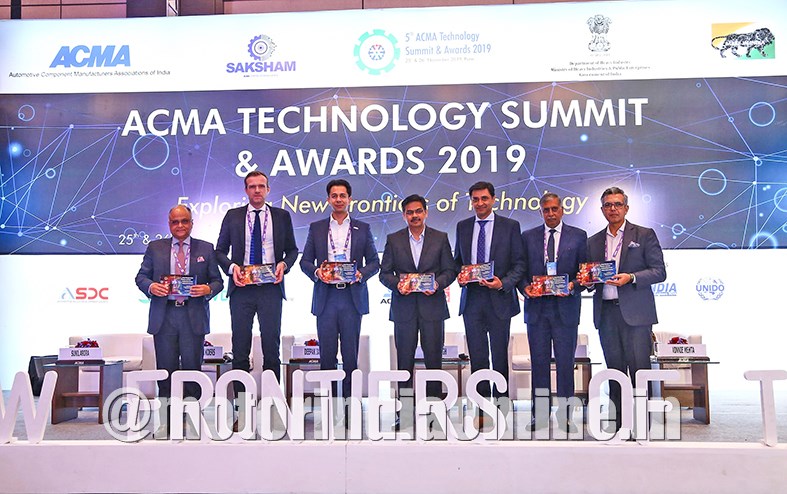It was also an occasion for the presentation of ACMA Annual Awards at the event held in Pune on November 25 and 26
Automotive Component Manufacturers Association of India (ACMA), the apex body of the auto component industry in India, successfully hosted the fifth edition of ACMA Technology Summit on November 25 and 26 in Pune. This year’s theme ‘Exploring New frontiers of Technology’ was aimed at ACMA’s endeavour to facilitate the auto component industry in identifying disruptive challenges and delineate a roadmap for its future. The 5th ACMA Technology Summit brought together national and international experts in technologies that are shaping the automotive environment of tomorrow. The summit witnessed incisive sessions on the future of mobility, green mobility, Industry 4.0, electric mobility, AI, blockchain, design thinking, and autonomous driving, among others.

The summit was graced by eminent personalities from the government and the industry including Deepak Jain, President, ACMA; Girish Wagh, President and Head-CVBU, Tata Motors Ltd.; Dr. Martin Koers, Managing Director, German Association of the Automotive Industry (VDA); Pravin Agarwal, Joint Secretary, Department of Heavy Industry, Government of India; Ashok Sharma, Assistant Vice President and Operating Head, Honda Cars India; Raju Ketkale, Senior Vice President and Director, Toyota Kirloskar Motors; Sarwant Singh, Managing Partner, Frost and Sullivan; to name a few. The summit also witnessed conferring of ACMA Annual Awards, honouring excellence in the auto component industry.
Out of a total of 161 applicants, 62 winners were awarded this year. The winners of the ACMA Annual Award also shared their success stories at the summit. These awards are one of the most sought-after recognitions in the Indian auto component industry. These were instituted in 1966 and are presently bestowed for excellence in export, new product design and development, process technology, manufacturing, supplier development, human resource, inclusive growth – a Make in India drive, health, safety and environment, and unique initiatives. The event also witnessed the launch of ACMA-Frost and Sullivan study on ‘Mega Themes of the Future – Opportunities for the Indian Auto Industry’.
The study dwells extensively on disruptions being faced by the Indian automotive industry in the form of connected, autonomous, shared and electric (CASE) technologies. It also highlights how these disruptions are fuelling innovation, bringing in new business models, and creating revenue-generating hotspots. At the event ACMA also signed MoUs with the Centre for Development of Advanced Computing (C-DAC) and Society of Automotive Engineers, India (SAEINDIA), as knowledge partners for ACMA Centre of Excellence (ACoE). With C-DAC, ACMA would work together to develop content for training programs and collaborate in designing and setting up of labs, conduct workshops and knowledge sessions, provide technology services using C-DAC products and technology, and develop e-learning platforms customized for the auto sector.
Commenting on the rapidly changing dynamics in the industry, Deepak Jain said: “The automotive industry in India is undergoing significant stress due to plummeting sales, which in turn has adversely impacted the performance of the components sector. But with sound macro-economic fundamentals and the recent interventions by the government, it is only a matter of time that the growth will return to the industry. It is therefore necessary to ensure that the industry is prepared for the next growth cycle, especially our Tier II and III.”